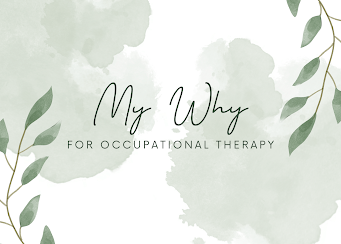My "Why" for Occupational Therapy
Why OT? I get asked this question more often than you think. From grad school interviews to getting asked by my own professors in class, this question never goes away. I always knew I wanted to be in the healthcare field since I was a little girl, but I never knew what I wanted to be exactly. I have always had the creativity, the caring aspect, and the friendless approach of someone who would be willing to be in the medical field and interact with people daily. I explored many options of what career was truly for me by taking career tests and doing my own research. After continuously researching and taking medical courses in high school, I had a few career paths in mind that I wanted to pursue. From bouncing between the ideas of being a physician’s assistant and a physical therapist, I was totally unaware of what occupational therapy even was. Luckily, I had a chance to shadow my first occupational therapist during my sophomore year of undergrad to help broaden my understanding of the career. I was able to shadow at the Fort Sanders Regional Hospital in Knoxville, TN and I was introduced to a whole new world. The creativity, the holistic and client-centered approach, and all these other aspects of Occupational Therapy caught my eye immediately.
The World Federation of Occupational Therapy (2012) defines occupational therapy as a “client-centered health profession concerned with promoting health and well-being through occupation.” This profession caught my eye after I had the chance to shadow because of the creativity aspect that was used to help clients perform to the best ability for their daily occupations. It was not just a profession where you go to your doctor and talk for five minutes and then move on with your day. This was a profession where you closely work with the clients and help them get back to doing things they truly love! You develop a close rapport with your clients and understand who they are. I also had the experience to work as a physical therapy technician in an outpatient clinic and that helped me dip my toes into the therapy world. I worked with patients daily and learned every detail about them as I listened to not only their problems but the small details about what makes them, them. The patients I worked with would always tell me how they enjoyed therapy because it was not just a place where they came to do their physical therapy for the day, but it was a place where you got to talk to your friends and make physical therapy enjoyable. I always made sure everyone’s frown was turned upside down after they left, and honestly, it made me feel so much better as a person. Making someone else smile or laugh made me feel a bit better knowing that I had the ability to build a relationship like that and have people trust me to not only help them get better but to also become a person they can rely on.
AOTA (2017) states that one of the philosophies of occupational therapy is that "occupations occur within diverse social, physical, cultural, personal, temporal, or virtual contexts." I feel as if my past experiences have helped me get into this mindset and learn to establish a dynamic relationship with clients as I will also help them improve their quality of performance. When I am out in fieldwork soon, I will probably be in an area of practice where I am not used to the culture or diversity of the area and the people living there. I would have to go out of my way to understand their occupations if I am not familiar with them. To be able to clearly communicate and build a stable and trusting relationship will be helpful when it comes to fulfilling this philosophy because as a future occupational therapist, it is my job to advocate for my future clients. They should be able to complete their occupations and not have a barrier where they cannot. My leadership skills would also be shown as I might have to take initiative and be there for my clients. Everyone should be able to fulfill their occupations no matter how different it is than the norm.
I find myself explaining to people almost every week about the occupational therapy field and advocating for the profession. Luckily in our Foundations course, we were taught the importance of what an elevator speech is and how often it can be used. As much as I love to talk, I can surely pitch an elevator speech about occupational therapy anywhere and at any time. Let's say, for example, a CEO of a large hospital system is visiting campus one day and sees me wearing an occupational therapy shirt. He sees me in my scrubs and assumes I am an occupational therapy student and tells me he has heard about the profession but is not so clear on what exactly the difference is between occupational therapy and physical therapy. One of my favorite things to start off with is giving a scenario. I would ask the CEO to imagine being in a room and needing to get out. I would say "You could simply walk out of the room but you can't leave the room without putting your pants on!" I would go on and explain how physical therapy will help you physically walk out of the room but putting on your pants is a daily occupation, or role, that you must complete and accomplish every day. I would explain that we also like to refer to our patients as clients as we do not want them to think something is wrong with them since we consider looking at the client from a holistic point of view. As the CEO is a CEO of a large hospital system, I am sure they are aware and notice that there are occupational therapists within the hospital, but I would also mention that occupational therapists are seen just about everywhere. Occupational therapists could be seen in the school systems, at skilled nursing facilities, and even at outpatient clinics. Whereas occupational therapy and physical therapy do overlap in many ways and work together, their own differences are what make each field different and special.
So, why OT? To put it simply, I love being there for people no matter what. Whether it be doing the small things for some or something life-changing, it never hurts to be a decent human being. To be in a profession that genuinely cares for its clients and their needs is the most honorable feeling. I cannot wait to meet my future clients and hope to be someone that impacts their life in a positive way. Here is to a career journey full of growth, experiences, and a lifetime of elevator speeches!
References:
About occupational therapy. WFOT. (2023, April 5). Retrieved April 5, 2023, from https://wfot.org/about/about-occupational-therapy
American Occupational Therapy Association. (2017, August 28). Philosophical base of occupational therapy. American Occupational Therapy Association. Retrieved April 5, 2023, from https://research.aota.org/ajot/article/71/Supplement_2/7112410045P1/6364/Philosophical-Base-of-Occupational-Therapy




Comments
Post a Comment